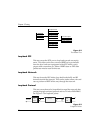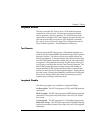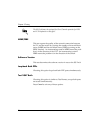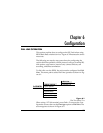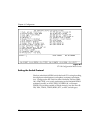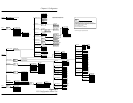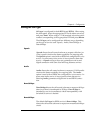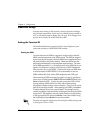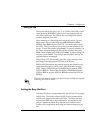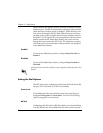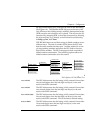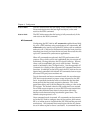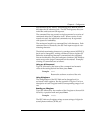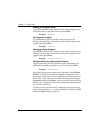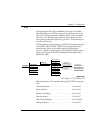
Chapter 6. Configuration
32
ISU 2x64 Dual Port ISDN Service Unit User Manual 61200051L1-1D
Smart Dial Strings
In some cases during a dial session it may be desired to change
the call type temporarily. At the end of a dialed phone number, a
#1,2,3, or 4 can be used to change the call type. A #1 changes it to
speech, #2 to Audio, #3 to 56K, and #4 to 64K.
Setting the Terminal ID
Terminal identification is assigned by the local telephone com-
pany and consists of a SPID and LDN number.
Setting the SPID
In North America, the SPID is a sequence of digits used to identify
ISDN terminal equipment to the ISDN switch. The SPID is assigned
by the local phone company when the ISDN line is installed and usu-
ally looks similar to the phone number. Obtain the SPIDs from the
telephone administrator or local telephone representative. The num-
ber of SPIDs required (0, 1, or 2) depends on how the ISDN line is con-
figured. For instance, a point-to-point line has no SPID. Multipoint
lines may have one or two SPIDs. If the line has only one SPID, then
it must be entered in SPID DTE#2. It is recommended to use two
SPIDs with the ISU 2x64, with a SPID assigned to each DTE port.
When entering a SPID using the front panel, use the Up and Down
arrow keys to select between SPID DTE#1 and SPID DTE#2. Press
Enter to select the DTE. Use the keypad to enter the SPID. While
keying/editing a SPID, the Down arrow allows backspacing
through the number string to correct mistakes. The Up arrow scrolls
back to the last digit entered. After entering each SPID, press Enter.
To abort changes at any time, press Cancel. The changes are dis-
carded, leaving the original number unchanged. If entering the SPID
using the VT 100 terminal, select the option number corresponding
to the appropriate DTE and press Return. Enter the number using
the keyboard and press Return to store the number.
Disconnect the network interface from the unit before initially entering and/
or altering the SPIDs or LDNs.



